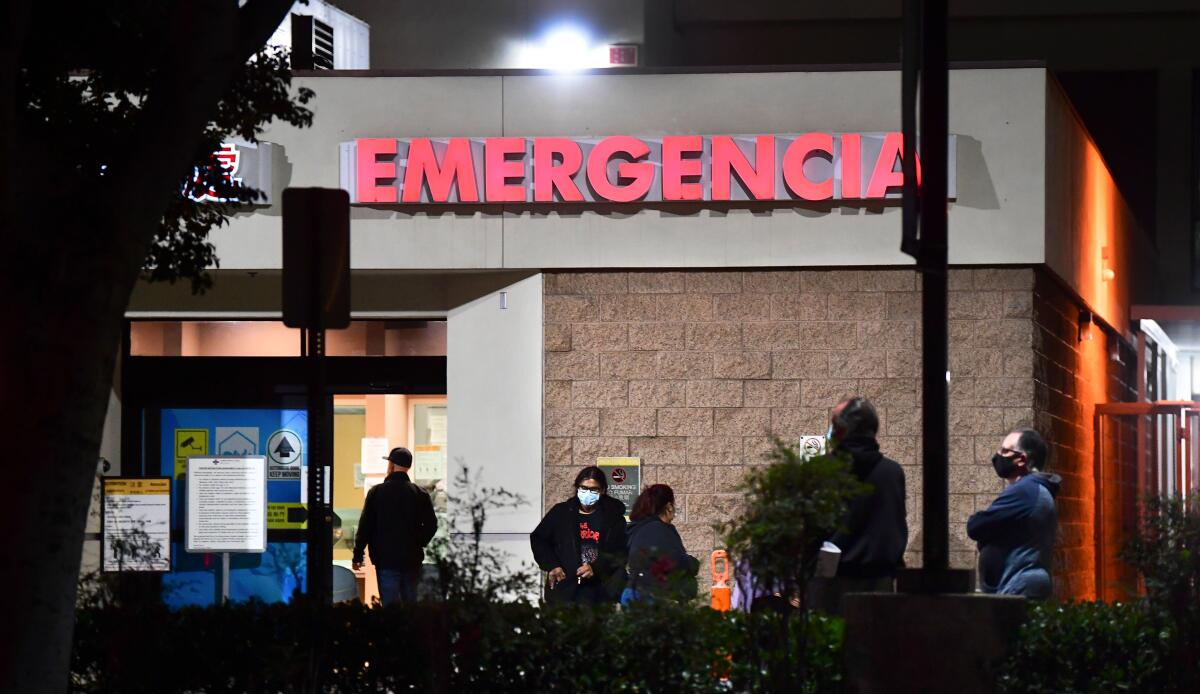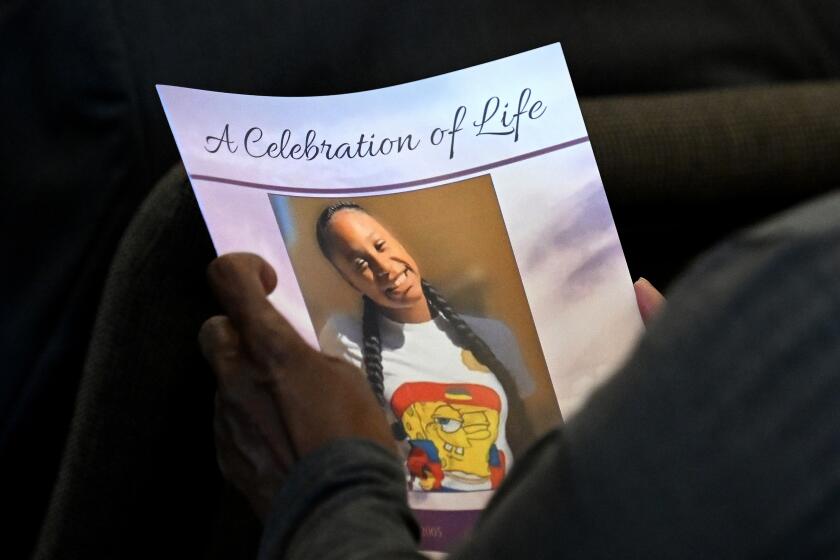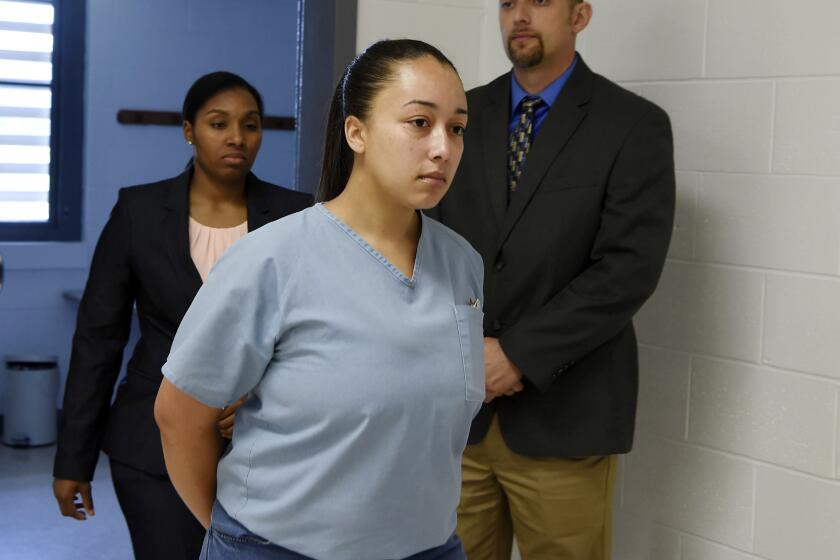Forcing rape victims to pay for emergency medical care is devastating and cruel

- Share via
In the summer of 2021, a woman seeking an abortion came to the Texas clinic where I worked as a physician. She’d been raped and was 15 weeks pregnant. I was the first medical provider she had seen since being assaulted. She told me she hadn’t gone to the emergency room after her rape because she was uninsured and afraid of racking up a huge medical bill.
It was not the first time I’ve heard such a story.
Immediate medical care after a rape — usually delivered in emergency rooms — is essential to the health and recovery of victims of sexual violence. In many ERs, specially trained nurses perform forensic exams to collect evidence for use in a prosecution if the attacker is ever caught. In most cases, the federal Violence Against Women Act — a law that’s supposed to protect survivors of sexual violence — pays for the forensic exam through state-run victim compensation funds.
But a forensic exam is far from the only medical service rape victims need. They need medications to prevent serious sexually transmitted infections such as HIV, and sometimes they need repair of injuries such as vaginal or rectal lacerations. They often need mental health treatment and usually need emergency contraception to prevent pregnancy.
Though they make up less than 5% of L.A.’s population, Black women are far more likely to experience multiple forms of violence and trauma than other groups.
Since the federal law doesn’t cover the full range of necessary services, getting them can be financially catastrophic for victims. As my colleagues and I reported in a study in the New England Journal of Medicine, victims of sexual violence are often expected to pay for at least some of their care out of pocket, and that presents a powerful disincentive for women to seek care at a time they desperately need it.
We analyzed more than 35 million ER visits and identified 112,716 survivors of recent sexual assaults in 2019. More than 17,000 of the victims we identified were expected to pay out of pocket for their ER care; they were charged an average of $3,673. Even privately insured survivors paid, on average, 14% of the total costs of their ER care (more than $900), because most private coverage carries copayments and deductibles, and many ERs are “out of network.” These are steep costs for most people, but particularly for the low-income women and girls who most frequently suffer sexual assaults.
I cared for my Texas patient a few weeks before that state’s six-week abortion ban took effect, so she could choose whether to terminate her pregnancy. That choice is no longer available in Texas. In the year since Roe vs. Wade was overturned, legislators there and in eight other states — Alabama, Arkansas, Kentucky, Louisiana, Missouri, Oklahoma, South Dakota and Tennessee — have outlawed all abortions, even for pregnancies resulting from rape.
When girls of color have been victims of trafficking or prostitution, they are all too often charged with crimes. Only federal action can provide broad protections.
“Rape exceptions” were once the norm in anti-abortion states, and even in today’s brutal post-Roe environment, a few Republican lawmakers can’t stomach forcing rape survivors to carry the pregnancy for nine months. The abortion bans in Idaho, West Virginia and Mississippi include nominal exceptions for rape survivors. But to actually obtain an abortion in those states, victims are typically required to report the crime to the police and prove they have received rape-related medical examinations.
Those innocuous-sounding requirements hide a hard truth. For many survivors, getting medical care after rape comes with an impossible price tag. Knowing they can’t afford a $3,600 medical bill, they will never seek care at all.
At the very least, the Violence Against Women Act should be amended to ensure that state victim compensation funds cover all essential medical care for rape survivors, not just forensic exams. And all states — including those with abortion bans — should ensure that abortion care is actually accessible for rape-related pregnancies.
But many victims of sexual violence do not want to disclose the assault, and they need medical care too. Medicaid coverage, which does not force victims to disclose assault, is a critical lifeline for low-income victims of sexual violence.
Yet even states that have already expanded Medicaid still leave many uninsured and privately insured survivors vulnerable to large medical bills.
In California, for example, many survivors of sexual violence with private health coverage end up with medical bills amounting to hundreds or thousands of dollars due to high insurance copayments or deductibles. In theory, victims can apply to the state’s Victim Compensation Board for assistance, but the process is drawn out and bureaucratic. Systemic racism is also baked into the victim compensation system, since survivors with prior felony convictions, which are far more common among people of color, are automatically excluded from many states’ victim compensation programs, including California’s. A universal public insurance program would ensure that all victims are able to afford care after an assault.
Our society has long stigmatized victims of sexual violence and has never guaranteed them the medical care and support they deserve. In post-Roe America, the combination of anti-abortion politicians and our unjust healthcare system compound rape victims’ suffering — adding financial insult to unimaginable injury.
Samuel Dickman is a physician, researcher and the chief medical officer of Planned Parenthood of Montana.
More to Read
A cure for the common opinion
Get thought-provoking perspectives with our weekly newsletter.
You may occasionally receive promotional content from the Los Angeles Times.











